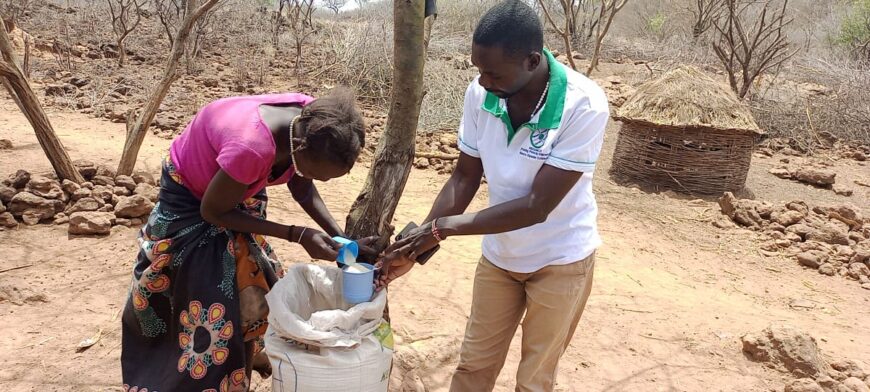Severe flooding hit Kenya in October 2023 and lasted for about two months, causing significant damage. The floods have claimed the lives of at least 1,781 people and displaced over 64,000 households. The floods have destroyed infrastructure and severely affected communities' livelihoods, especially amongst agro-pastoral communities in the Arid and Semi-Arid Lands (ASALs), causing considerable loss of livestock and businesses.
ASALs are areas where cyclic shocks disproportionately affect pastoral and agro-pastoral communities. Poverty rates already run high in these regions, and over 95% of household incomes depend on livestock.
Unfortunately, the floods have worsened the humanitarian crisis in the region, as it was just beginning to recover from the worst drought in four decades, which has left millions of people hungry.
Chemutai Jemor [1] and her family have been struggling with food insecurity, lack of access to clean water, and disease infestation for a long time. To provide for her family’s basic needs, Chemutai requires financial support to buy food and start a small-scale business to sustain an income and provide for her family now and in the future.
Together with her husband Kimingich, they were among the beneficiaries of the Multipurpose Cash transfer program funded by the Norwegian Ministry of Foreign Affairs (NMoFA) and implemented by RECONCILE in collaboration with Acted, IMPACT, and the Asal Humanitarian Network (AHN) in Baringo County.
Their lives took a new turn after their enrollment in the cash program for they had long endured the harsh realities of living in an environment where survival was a daily battle. It was a challenge for most of the residents of Kinyach village to get even one meal a day and water for domestic use. Therefore, for the beneficiaries of this program, the cash transfer came at a time of despair while being overwhelmed with severe hunger, thirst, and malnutrition.
My family and I faced the harsh reality of constantly struggling to find enough food and water every day. I have always wished to have enough money to start a sustainable business selling food products like sugar or flour to my community. This could help us avoid walking over 10km every day to buy food.
Their journey to get water was an incredibly challenging task. They had to walk approximately 10 kilometres to and back every day carrying water jerricans. After hours of walking, they would return home with only 10 litres of water, which in normal circumstances, was barely enough to sustain them until the next day. As a result, they had to limit themselves to one meal a day at most and hardly had enough water for drinking and bathing.
With limited resources and barren lands, their meals were meagre and often insufficient to meet their nutritional needs. , with the majority exhibiting poor household dietary diversity.
Advancing livelihoods for sustainable income streams
Before the intervention, the beneficiary was displaying symptoms of malnutrition. Unfortunately, none of the family members enrolled on supplementary feeding programs or outpatient therapeutic feeding programs.
The malnourishment was because of their limited access to sufficient food, which resulted in them being susceptible to diseases due to their harsh living conditions. Chemutai confirmed that her family was suffering from malnutrition, malaria, chest problems, and constant mouth sores.
The Multipurpose cash transfer program has significantly improved the lives of its beneficiaries by providing them with more opportunities to invest in sustainable businesses. As a result, most families can now afford to have three meals a day, thanks to the 3 cycles of cash transfer. For instance, Chemutai was able to start a business with the cash she received, and now she can provide food and clothing for her family sustainably using the profits generated.
Her family’s food security has been addressed and she can comfortably purchase different varieties of food for them to boost their nutrition and health.
Despite facing many challenges, the community in Kinyach village has remained resilient and hopeful for a better future. They hope that there will be more cash transfer cycles to help those who have not benefitted from the cash transfers to cope with the impact of drought.
Since 2019, Acted, the ASAL Humanitarian Network (AHN), and other partners have collaborated to establish a localized mechanism to provide timely and transparent humanitarian assistance to ASAL communities impacted by cyclical climate shocks. This mechanism is known as the Kenya Cash Consortium, and it uses mobile money platforms to transfer international funds quickly to the most suitable local NGOs across the ASAL Counties. The suitable NGOs will send the funds to selected beneficiaries to deliver an effective cash-based response to the communities affected by the crisis.

[1] The beneficiaries’ names have been changed to protect their identity.